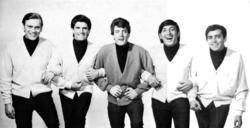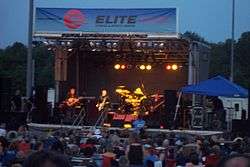Tommy James and the Shondells
| Tommy James and the Shondells | |
|---|---|
|
Tommy James & the Shondells on their 2010 tour | |
| Background information | |
| Also known as |
|
| Origin | Niles, Michigan, U.S. |
| Genres | |
| Years active | 1960–present |
| Labels | Roulette |
| Associated acts | Hog Heaven |
| Website |
tommyjames |
| Members |
|
| Past members |
|
Tommy James and the Shondells are an American rock band, formed in Niles, Michigan in 1960.[1] They had two No. 1 singles in the U.S., "Hanky Panky" (July 1966, their only RIAA Certified Gold record) and "Crimson and Clover" (February 1969), and also charted twelve other Top 40 hits, including five in the Hot 100's top ten: "I Think We're Alone Now", "Mirage", "Mony Mony", "Sweet Cherry Wine", and "Crystal Blue Persuasion".[2]
History

The band formed in 1960 in Niles, Michigan, first as the Echoes, then as Tom and the Tornadoes, with 12-year-old Tommy James (then known as Tommy Jackson) as lead singer. The group released its first single, "Long Pony Tail", in 1962.[3] In 1964 James renamed the band the Shondells because the name "sounded good." At this time, the band included Tommy James (vocals and guitar), Larry Coverdale (lead guitar), Larry Wright (bass), Craig Villeneuve (keyboards) and Jim Payne (drums). In February 1964 the band recorded the Jeff Barry–Ellie Greenwich song "Hanky Panky" (originally a B-side by the Raindrops[4]). Released by Snap Records, a local label, James's version sold respectably in Michigan, Indiana and Illinois, but Snap Records had no national distribution. The band toured the eastern Midwest, but no other market took to the song. The single failed to chart nationally, and the Shondells disbanded in 1965 after its members graduated from high school.
After first considering taking a job outside of music, James decided to form a new band, the Koachmen, with Shondells guitarist Larry Coverdale and members of a rival group called the Spinners (not the hit-making group from Detroit). The Koachmen played a circuit of clubs in the Midwest through the summer and fall of 1965 but returned to Niles in February 1966, after the gigs dried up, to plot their next move.
Meanwhile, in 1965, Pittsburgh dance promoter Bob Mack unearthed the forgotten single "Hanky Panky", playing it at various dance parties, and radio stations there touted it as an "exclusive". Listener response encouraged regular play, and demand soared. Bootleggers responded by printing 80,000 black market copies of the recording, which were sold in Pennsylvania stores.
James first learned of all this activity in April 1966 after getting a telephone call from Pittsburgh disc jockey "Mad Mike" Metro to come and perform the song. James attempted to contact other members of the Shondells, but they had all moved away, joined the service or gotten married and left the music business altogether.
In April 1966, James went by himself to make promotional appearances for the Pittsburgh radio station in nightclubs and on local television. He recruited a quintet from Latrobe, Pennsylvania, at the Thunderbird Lounge in Greensburg called the Raconteurs – Joe Kessler (guitar), Ron Rosman (keyboards), George Magura (saxophone), Mike Vale (bass), and Vinnie Pietropaoli (drums) – as the new Shondells.[5] "I had no group, and I had to put one together really fast," recalled James. "I was in a Greensburg, P.A. club one night, and I walked up to a group that was playing that I thought was pretty good and asked them if they wanted to be the Shondells. They said yes, and off we went."
With a touring group to promote the single, James went to New York City, where he sold the master of "Hanky Panky" to Roulette Records, at which time he changed his last name to James. With national promotion, the single became a No. 1 hit in July 1966. Before long, Kessler and Pietropaoli were forced to leave after a dispute when planned monies were not paid to them by Roulette. They were replaced by Eddie Gray and Peter Lucia; Magura departed as well.[5]
At first, Tommy James and His Shondells played straightforward rock and roll, but soon became involved in the budding bubblegum music movement. In early 1967 songwriter Ritchie Cordell gave them the No. 4 hit "I Think We're Alone Now" and the No. 10 hit "Mirage". In 1968, James had a No. 3 hit with "Mony Mony". Co-written by James, Cordell, Cordell's writing partner Bo Gentry, and Bobby Bloom, "Mony Mony" reached No. 3 in the US and was a British No. 1 in 1968. The title was inspired by a flashing sign for Mutual Of New York visible from James's apartment balcony in New York.[3] He followed it with the song "Do Something to Me". However, James was labeled as a bubblegum pop artist, which he hated. Therefore, he changed his style to psychedelic rock.
From late 1968, the group began writing their own songs, with James and Lucia penning the psychedelic tinged classic "Crimson and Clover". The song was recorded and mixed by Bruce Staple, with James tackling vocal duties and playing many of the instruments himself, and featured the creative use of studio effects such as delay and tremolo.[6] The group had toured with Vice President Hubert Humphrey during his presidential campaign. Humphrey showed his appreciation by writing the liner notes for the Crimson and Clover album.[7]
Further hits included "Sweet Cherry Wine", "Crystal Blue Persuasion", and "Ball of Fire", all from 1969. They also produced "Sugar on Sunday", later covered by the Clique. As the band embraced the sounds of psychedelia, they were invited to perform at the Woodstock concert but declined.

The group continued until 1970.[8] At a concert in Birmingham, Alabama in March of that year, an exhausted James collapsed after coming off stage from a reaction to drugs and was actually pronounced dead. He recovered and decided to move to the country to rest and recuperate, and left the band.[9] His four bandmates carried on for a short while under the name of "Hog Heaven" but disbanded soon afterwards.
In a 1970 side project, James wrote and produced the No. 7 hit single "Tighter, Tighter" for the group Alive N Kickin'.[10] James launched a solo career in 1970 that yielded two notable hits over a 10-year span, "Draggin' the Line" (1971) and "Three Times in Love" (1980).
During the 1980s, the group's songbook produced major hits for three other artists: Joan Jett & The Blackhearts' version of "Crimson And Clover" (No. 7 in 1982), Tiffany's "I Think We're Alone Now" and Billy Idol's "Mony Mony" (back-to-back No. 1 singles in November 1987). Other Shondells covers have been performed by acts as disparate as psychobilly ravers the Cramps, new wave singer Lene Lovich, country music veteran Dolly Parton and the Boston Pops orchestra.
In the mid-1980s Tommy James began touring in oldies packages with other acts from the 1960s sometimes billed as Tommy James & the Shondells, although he is the group's only original member. A Greenwich Village nightclub appearance was filmed and released as Tommy James & the Shondells: Live! At The Bitter End.[11]
In 2009, James and the surviving Shondells, Gray, Vale and Rosman, reunited to record music for a soundtrack of a proposed film based on James' autobiography, Me, the Mob, and the Music, released in February 2010. The group still gets together from time to time for special video/TV events and nostalgia shows.
In March 2011, the Tommy James song "I'm Alive" (co-written with Peter Lucia) became a top 20 hit in the Netherlands for UK singer Don Fardon after his version had been used in a Vodafone commercial. The song originally appeared on the Crimson and Clover LP.
In 2012, "Crystal Blue Persuasion" was used in the eighth episode of the fifth season of Breaking Bad, "Gliding Over All", during a montage depicting the process involved to bring main character Walter White's methamphetamine operation and its signature blue crystal meth to an international level.
Discography
Albums
| Year | Album | Billboard 200 | Record Label |
|---|---|---|---|
| 1966 | Hanky Panky | 46 | Roulette Records |
| 1967 | It's Only Love | – | |
| I Think We're Alone Now | 74 | ||
| Gettin' Together | – | ||
| 1968 | Mony Mony | 193 | |
| 1969 | Crimson & Clover | 8 | |
| Cellophane Symphony | 141 | ||
| 1970 | Travelin' | 91 |
Compilation Albums
| Year | Album | Billboard 200 | Record Label |
|---|---|---|---|
| 1967 | Something Special! The Best of Tommy James and The Shondells | 174 | Roulette Records |
| 1969 | The Best of Tommy James and The Shondells | 21 | |
| 1989 | Anthology | – | Rhino Records |
| 1993 | The Very Best of Tommy James and the Shondells | – | |
| 2002 | The Essentials | – | |
| 2008 | 40 Years: The Complete Singles Collection (1966-2006) | – | Aura Records |
Singles
- Tom and the Tornadoes
| Year | Title | Peak chart positions | Record Label | B-side | |||
|---|---|---|---|---|---|---|---|
| US | AC | R&B | UK | ||||
| 1962 | "Long Pony Tail" | – | – | – | – | Northway Sound Records | "Judy" |
- The Shondells
| Year | Title | Peak chart positions | Record Label | B-side | |||
|---|---|---|---|---|---|---|---|
| US | AC | R&B | UK | ||||
| 1964 | "Hanky Panky" | – | – | – | – | Snap Records | "Thunderbolt" |
| 1966 | "Hanky Panky" | – | – | – | – | Red Fox Records | "Thunderbolt" |
- Tommy James and the Shondells
| Year | Title | Peak chart positions | Record Label | B-side From same album as A-side except where indicated |
Album | |||
|---|---|---|---|---|---|---|---|---|
| US | AC | R&B | UK | |||||
| 1966 | "Hanky Panky" | 1 | – | 39 | 38 | Roulette Records | "Thunderbolt" (Non-LP track) | Hanky Panky |
| "Say I Am (What I Am)" | 21 | – | – | – | "Lots of Pretty Girls" | |||
| "It's Only Love" | 31 | – | – | – | "Ya! Ya!" | It's Only Love | ||
| "It's Only Love" | – | – | – | – | "Don't Let My Love Pass You By" | |||
| 1967 | "I Think We're Alone Now" | 4 | – | – | – | "Gone, Gone, Gone" | I Think We're Alone Now | |
| "Mirage" | 10 | – | – | – | "Run, Run, Baby, Run" | |||
| "I Like the Way" | 25 | – | – | – | "(Baby, Baby) I Can't Take It No More" | |||
| "Gettin' Together" | 18 | – | – | – | "Real Girl" (from Something Special! The Best Of Tommy James & The Shondells) |
Gettin' Together | ||
| "Out of the Blue" | 43 | – | – | – | "Love's Closin' in on Me" | Something Special! The Best Of Tommy James & The Shondells | ||
| 1968 | "Get Out Now" | 48 | – | – | – | "Wish It Were You" (Non-LP track) | Mony Mony | |
| "Mony Mony" | 3 | – | – | 1 | "One Two Three and I Fell" | |||
| "Somebody Cares" | 53 | – | – | – | "Do Unto Me" | |||
| "Do Something to Me" | 38 | – | – | – | "Gingerbread Man" (from Mony Mony) | Crimson & Clover | ||
| "Crimson and Clover" | 1 | – | – | – | "Some Kind of Love" (from Mony Mony) | |||
| 1969 | "Sweet Cherry Wine" | 7 | – | – | – | "Breakaway" (from Crimson and Clover) | Cellophane Symphony | |
| "Crystal Blue Persuasion" | 2 | 27 | – | – | "I'm Alive" | Crimson & Clover | ||
| "Ball of Fire" | 19 | – | – | – | "Makin' Good Time" (from Cellophane Symphony) | The Best of Tommy James and The Shondells | ||
| "She" | 23 | – | – | – | "Loved One" (from Cellophane Symphony) | Travelin' | ||
| 1970 | "Gotta Get Back to You" | 45 | – | – | – | "Red Rover" | ||
| "Come to Me" | 47 | – | – | – | "Talkin' and Signifyin'" (from Travelin') | Tommy James | ||
Further reading
- James, Tommy (with Martin Fitzpatrick), Me, the Mob, and the Music: One Helluva Ride with Tommy James and the Shondells, New York : Scribner, 2010. ISBN 978-1-4391-2865-7
References
- ↑ Patricia Romanowski; Holly George-Warren; John Pareles (November 8, 2001). The Rolling Stone Encyclopedia of Rock and Roll. Touchstone. p. 483. ISBN 9780743201209.
- ↑ Joel Whitburn (2003). Top Pop Singles. Record Research. pp. 349–350. ISBN 0-89820-155-1.
- 1 2 Tommy James and the Shondells.40 Years: The Complete Singles Collection (1966–2006). CD booklet. Aura Records, 2008.
- ↑ "Hanky Panky: The Raindrops | Listen, Appearances, Song Review". AllMusic. 2008-08-25. Retrieved 2015-08-19.
- 1 2 Bruce Eder (1947-04-20). "Tommy James & the Shondells | Biography". AllMusic. Retrieved 2015-08-19.
- ↑ Buskin, Richard (June 2010). "Tommy James & The Shondells ‘Crimson & Clover’ - Classic Tracks". Sound On Sound. SOS Publications Group. Retrieved 7 July 2015.
- ↑ "Tommy James & the Shondells Official Website". Tommyjames.com. Retrieved October 28, 2009.
- ↑ Murrells, Joseph (1978). The Book of Golden Discs (2nd ed.). London: Barrie and Jenkins Ltd. pp. 206, 224, 242 & 262. ISBN 0-214-20512-6.
- ↑ "Djallyn.org". Djallyn.org. Retrieved 2011-03-22.
- ↑ "Tighter, Tighter - Alive 'N Kickin' | Listen, Appearances, Song Review". AllMusic. Retrieved 2015-08-19.
- ↑ Deming, Mark. "Tommy James & the Shondells: Live! At the Bitter End (2000)". The New York Times. Allmovie. Retrieved January 2, 2009.
